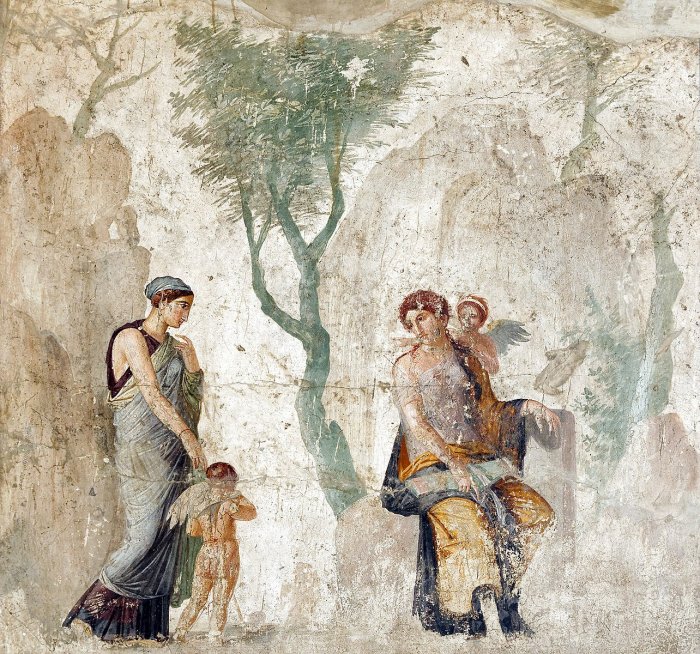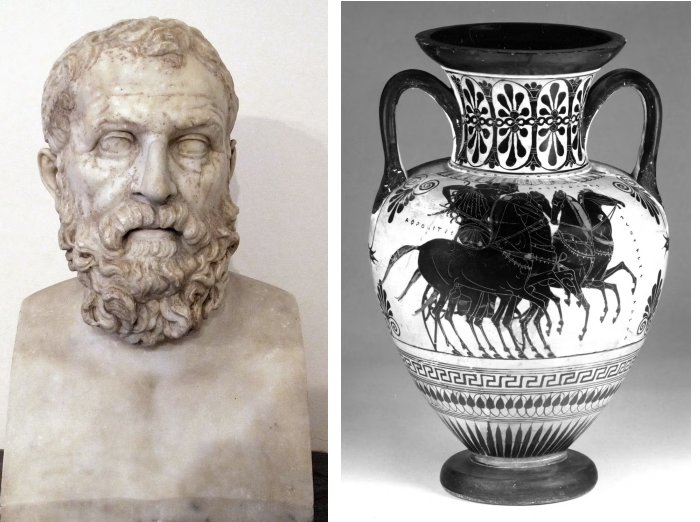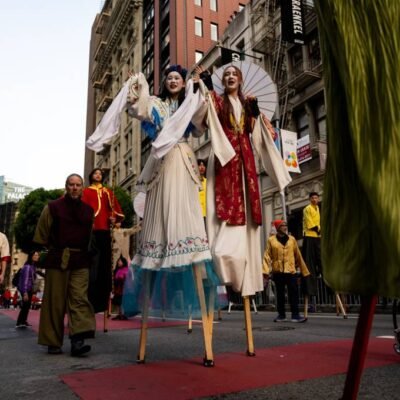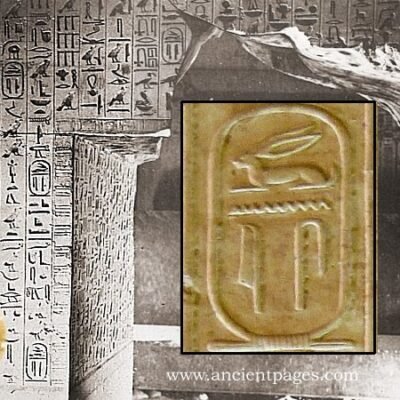AncientPages.com – For the ancient Greeks, Aphrodite was about so much more than love and beauty. In an overarching way, she was the goddess of consensus, as in any interaction between consenting people or groups of people.
Eros brought by Peitho to Aphrodite as Anteros laughs at his being punished for having chosen the wrong target, Pompeiian fresco, circa 25 BCE. Image credit: Levan Ramishvili – Public Domain
In politics, business and war, as well as human relationships, Aphrodite embodied the natural force, mixis, which translates into connections or dealings between persons or groups. It helped things to work smoothly in ancient society.
Aphrodite had many epithets (descriptive terms accompanying, or used in place of, a name) that showed her different qualities. Here are five examples of how the goddess Aphrodite – with varying epithets – reigned supreme in different realms through mixis.
1. Politics
The Athenians honoured their gods on a special day each month, the fourth for Aphrodite. Each year, on the fourth of Hekatombaion (roughly the beginning of our July) they celebrated Aphrodite’s feast, the Aphrodisia. Aphrodite shared this feast – and her cult site on the southwest slope of Athens’ Acropolis – with Peitho.
Peitho was the goddess of persuasion. Together they were thought to have united the people of Athens in a process of synoikism (the amalgamation of villages into one unified city state). This process really happened in Athens by the sixth century BC. There are many mythic versions of it; it’s hard to divide history from myth, especially in ancient Greece.
The travel writer Pausanias wrote that the Greek hero Theseus founded the cult of Aphrodite Pandemos (“common to all the people”), on completion of Athens’ synoikism. In his book on the life of Theseus, Greek philosopher and historian Plutarch adds that Theseus was guided by Aphrodite Epitragia (“on a goat”) on his journey towards Athens, where he was destined to become king, but that she also guided him in the synoikism and in founding her cult.
2. Business
Plutarch’s account is just one story. An alternative history claims that the Athenian lawmaker Solon founded Athens’ temple of Aphrodite Pandemos using the income of sex workers. This story comes from the third-century BC writer Athenaios, who cited the comic poet Philemon of Syracuse and an expert on poison (Nikander of Kolophon) as his sources.
Athenaios hailed from Naukratis, a trading emporium in the Nile River delta, where the oldest evidence of Aphrodite Pandemos has been found. As early as 615BC, Aphrodite had a small temple on the site. The use of her epithet Pandemos here likely refers to the many groups of foreigners who came together amicably in this business centre.
The ancient Greek historian Herodotus wrote stories about famous sex workers. He described them as “endowed with the blessings of Aphrodite” to emphasise their prospering businesses, although perhaps he was also playing with double entendre.
3. War
Copper ore is named for Cyprus (Kypros), the island’s most famous export.
Left: Bust of Solon, copy from a Greek original (circa 110BC). National Archaeological Museum/Wiki Commons, – CC BY-SA 4.0; Right: Dressed for battle, Aphrodite rides a chariot on this jar, circa 540BC. British Museum, CC BY-SA
Kyprian Aphrodite was a local Cypriote goddess who was patron of metal ores. Is it any wonder that she married Hephaestus, the god of metal working? Perhaps when she took Ares, god of war, as her lover, Aphrodite was attracted by his metal armour.
Dressed for battle, Aphrodite is shown riding a chariot across the surface of this Athenian amphora (storage jar), now in the British Museum. Ancient sources convey few stories of Aphrodite’s fighting abilities, but they do note the many warlike epithets used for her statues and cult centres: Areia (“warlike”), Encheios (“with a spear”), Hegemone (“leader”), Hoplismene (“armed”), Nikephoros (“bearer of victory”) and Strateia (“of the army”).
Figurines of warriors and hunters dedicated to Aphrodite at her temples indicate that she had a widespread following among military men. Clearly she supported the troops; worshipping her together bonded them as brothers in arms.
4. Human relationships
There is evidence of Aphrodite’s role in affairs of the heart that predates even Homer’s Iliad (which was written in the late-eighth or early-seventh century BC).
A skyphos, or deep cup, found in a grave from an early Greek cemetery at Pithekoussai, Italy, is decorated with one of the earliest Greek poetic inscriptions. Its three lines read: “I am [the cup] of Nestor, good for drinking. Whoever drinks from this cup, desire for beautifully crowned Aphrodite will seize him instantly.”
We know of Nestor, a wise Mycenaean king, from the Iliad, where his beautiful servant Hekamede brings him a four-handled golden drinking vessel.
The humble ‘cup of Nestor’ from Pithekoussai (circa 725BC). Marcus Cyron/Wiki Commons, CC BY-SA
What this humble “cup of Nestor” (above) from Pithekoussai lacks in splendour, it gains in reference to the powerful goddess Aphrodite.
5. Nature
Despite reigning over vegetation and fertility, Aphrodite was powerless to stop the death of her mortal lover, Adonis. So her worshippers throughout the eastern Mediterranean joined her in mourning his loss in Adoneia festivals.
The comic poet Euboulos wrote that Aphrodite laid Adonis on lettuce leaves after his death. So in Athens, Adonis’ death was symbolised by “broken pots” of lettuce, left to wither on the rooftops during the festivals.
Fragment of a wedding vase showing women celebrating the Adonia, circa 425BC. Louvre Museum
Ridiculed by contemporary comic poets, the supposed solemnity of the Adoneia has been largely dismissed as nonsense by later writers. In 290BC, the playwright Menander, for example, described the Adoneia as a raucous all-night party. That may explain why we have no fixed date for its celebration.
We know from ancient texts that Aphrodite’s followers brought natural offerings as votive gifts to her temples. In her poetic call to Aphrodite, the sixth century BC poet Sappho mentions apples, flowers, nectar and incense. Such organic offerings are aspects of antiquity that are largely lost, but archaeologists have also found pebbles and shells at Aphrodite’s sites. The memory of such recycled gifts, returning nature to nature, shows respect for Aphrodite from an ecological perspective.
Provided by The Conversation
This article is republished from The Conversation under a Creative Commons license. Read the original article.









